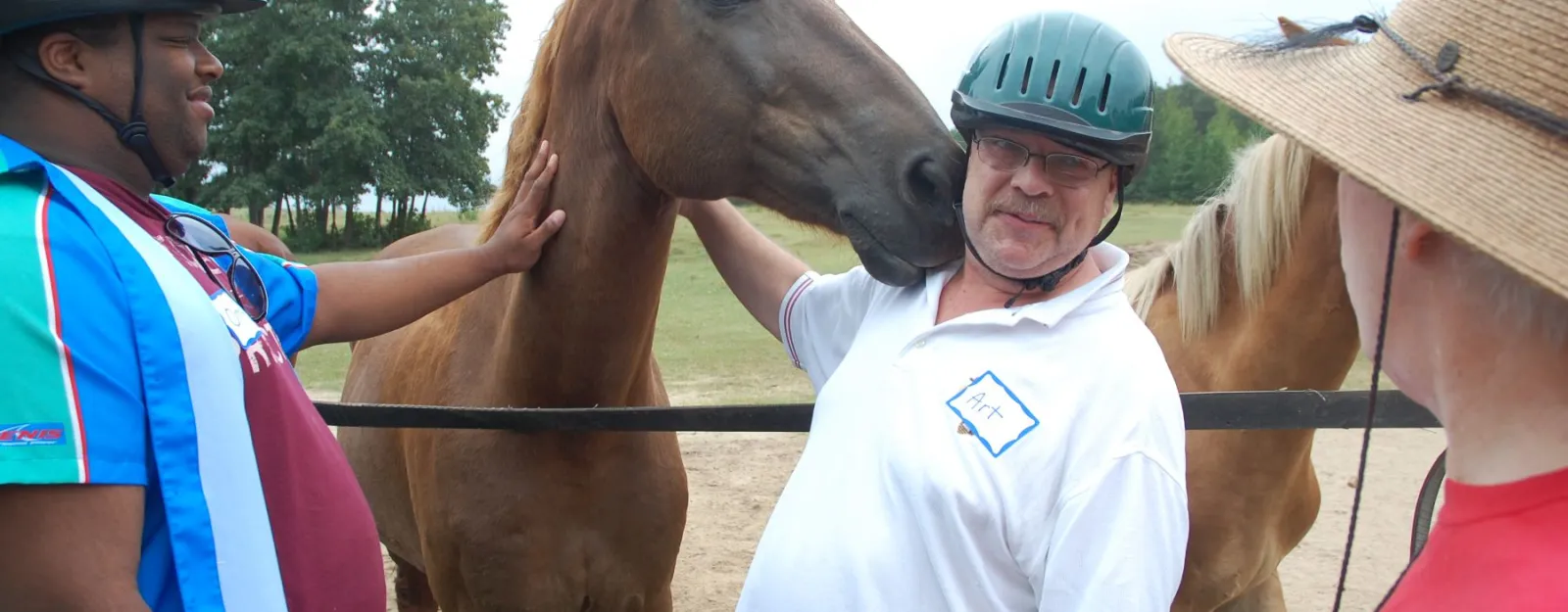As a combat medic in Iraq and Afghanistan, Donnie Gist saw the horrors of war firsthand. Back in the States after deployment, Gist-™s two sisters died a day apart.
 The trauma was almost too much to bear.
The trauma was almost too much to bear.
-�I was very depressed and had no way to channel my emotions,-� Gist says, -�but I had heard you could work through issues by learning to care for big animals.-� A rodeo cowboy helped him discover a healing love for horses.
Next, Donnie helped veterans in MUST supportive housing to overcome issues that prevent them from living successfully. On an outing to the Calvin Center, an equestrian therapy center in Hampton, Donnie saw new light in the eyes of several veterans as they overcame fears and made friends with the horses.
-�They were clearly nervous,-� Gist says. -�At the end, they were smiling and dismounted like cowboys, without any help. The look on their faces said a million words.-�
Something clicked
 Omar Edwards grew up in New York City, so his exposure to horses had been limited.
Omar Edwards grew up in New York City, so his exposure to horses had been limited.
-�The Bronx is not a horse place,-� says the Army veteran, who served nine months in Jalalabad, Afghanistan. -�I remember seeing a police horse in Central Park one time. Other than that, I saw some Animal Planet documentaries.-�
When Edwards met his Calvin Center horse for the day, Atticus, something immediately clicked.
-�We bonded, in a way,-� Edwards says. The horse was playful with him and kept tugging at his shirt. When Edwards climbed anxiously into the saddle, Atticus seemed to know exactly what he wanted him to do.
-�Grateful every morning-™
 Art McDaniel, on the other hand, grew up in rural Banks County, Georgia, where he had his own horse on the family farm. But it had been four decades since he had ridden.
Art McDaniel, on the other hand, grew up in rural Banks County, Georgia, where he had his own horse on the family farm. But it had been four decades since he had ridden.
McDaniel, a former Marine who struggles with PTSD, felt nervous about being around large animals again.
-�At first I wondered how I would react around them,-� he says. -�But then I remembered what it was like growing up, and my confidence came back.-�
The experience on horseback helped McDaniel realize in a new way just how much progress he has made through MUST-™s veterans programs.
-�I was pretty broken when I got here. There-™s been a lot of repair work done on me,-� he says. Every now and then, I still turtle up and withdraw into my shell.
-�Now I know I-™m in a safe place and I have good people around me,-� McDaniel adds. -�I have other vets who check in on me, and I just keep moving forward. I wake up grateful every morning.-�
Looking forward
Edwards, whose warehouse unit was attacked three times in Afghanistan, lives with OCD and finds it difficult to relate to others.
-�My first two weeks at MUST, I was always inside. I never came out to talk,-� he recalls. -�Then I decided to give it a chance. I mean, what was the worst that could happen? We would exchange stories, and I would learn something.
-�As I have grown, these guys have come to be more of a family,-� he adds. -�They all have put their lives on the line, and I have learned a lot from them. Life has steps, and we aren-™t in a race to the top. You have to take time with each one.-�
Through MUST-™s veterans services, donors and corporate sponsors help traumatized veterans understand that -�your yesterday is not your tomorrow,-� Gist says. -�The support of partners like The Home Depot Foundation lets veterans know somebody appreciates them. It helps veterans learn that they can grow and change.-�
How you can help
Adopt a veteran for Christmas: Contact [email protected]
Serve MUST-™s veterans in other ways: Email [email protected]
Corporate sponsorship of veterans program: Contact Don Crampton, [email protected]
Visit mustministries.org/veterans-supportive-housing
The Calvin Center-™s equestrian Therapy program: calvincenter.org
Mark Kelly writes for MUST Ministries.




